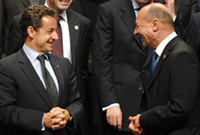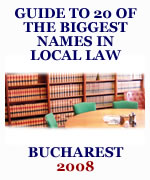Editorial
|
||||||||||||
 Romania’s political life has suffered in the last three years due to the failure of its leaders to accept the legitimacy of the election results in 2004. This has been the fatal flaw that has collapsed one coalition, forced a minority Government into office and caused stakeholders in Romanian society to wonder whether the country can agree on any policy. The executive and legislature are at a standstill. Meanwhile, there is an ongoing war between the head of state and his country’s cabinet, with Ministers pitching one emergency ordinance after another to the President, who strikes them back with his right to veto.
Romania’s political life has suffered in the last three years due to the failure of its leaders to accept the legitimacy of the election results in 2004. This has been the fatal flaw that has collapsed one coalition, forced a minority Government into office and caused stakeholders in Romanian society to wonder whether the country can agree on any policy. The executive and legislature are at a standstill. Meanwhile, there is an ongoing war between the head of state and his country’s cabinet, with Ministers pitching one emergency ordinance after another to the President, who strikes them back with his right to veto.
The Social Democratic Party’s (PSD) victory in the parliamentary elections in November 2004 was a result violated by multiple voting. Back then ‘The Diplomat - Bucharest’ asked an individual accused of helping fix elections in favour of the PSD, who did not deny the allegation, but snapped back: “I know of Democrats also guilty of fraud, you know!” Such accusations of childish tit-for-tat voter abuse from all sides have never received any adequate investigation.
Back then, incoming President Basescu refused to acknowledge the legitimacy of the November vote and aimed to force through early elections to consolidate his position with a more favourable Government. His failure to enable elections to take place has meant he has presided over an administration that he does not believe was placed their by the will of the people.
Meanwhile, the Government and most parliamentarians hold Basescu’s leadership in contempt. They continually fail to reach a compromise with him on policy and have attempted to oust him with a botched referendum, which history will probably declare as one of the most ridiculous acts of political opportunism the post-revolutionary administration has ever seen.
This month we enter an election season that will last until the end of next year, with the European Parliamentary elections this month, the local elections next Spring and the general election at the end of 2008. Every politician will begin a 15-month campaign. Bucharest is already witnessing new playgrounds appear in poor districts and, from the Government, financially questionable policies of wealth redistribution. It becomes a common theme that Governments switch to the right after elections and back to the left just before them.
The European elections on 25 November may capture the imagination of many people who feel they were robbed of their choice in 2004. It may become a popular European election, but not for the reason the technocrats of the European Commission may hope for - a genuine interest in European policy from its citizens. With all policies and justice stalled, no meaningful dialogue ongoing at the highest level and no compromise in sight, this vote is an opportunity for the people to declare which politicians they hold responsible for this state of affairs. They will vote against the object of their hate. This dress rehearsal for the two domestic elections next year may not indicate who will be the winners of 2008, but it will certainly indicate who the biggest losers are likely to be.

















